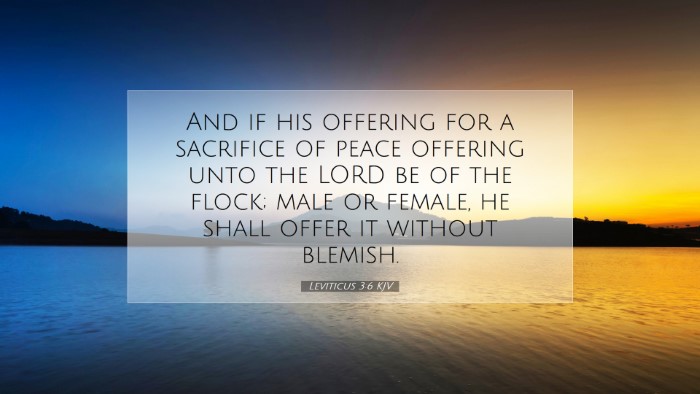Bible Commentary on Leviticus 3:6
Verse: "And if his offering for a sacrifice of peace offerings unto the LORD be of the flock; male or female, he shall offer it without blemish." (Leviticus 3:6)
Introduction
The third chapter of Leviticus is pivotal in understanding the sacrificial system established by God for the Israelites. It delineates the peace offerings, illustrating the relationship between God and His people. Leviticus 3:6 specifically emphasizes the requirements for the sacrificial offerings, spotlighting the necessity of offering animals without blemish. This verse lays the groundwork for understanding the nature of acceptable worship and the symbolism inherent in these offerings.
Insights from Commentators
Matthew Henry's Commentary
Matthew Henry provides a rich theological reflection on the peace offerings outlined in this chapter. He emphasizes the significance of peace offerings as a means of communing with God, suggesting they serve multiple purposes: thanksgiving, vows, or freewill offerings. In his view, peace offerings are a symbol of reconciliation, as they embody the concept of fellowship with God and among men.
- Nature of the Offering: Henry notes that the stipulation for a male or female offering indicates God's desire for diversity in worship, while the requirement for the animal to be unblemished speaks to the holiness and purity necessary in approaching God.
- Symbolism: He elucidates that such offerings represent not just a sacrifice but also a celebratory feast with God, highlighting the joy and peace resulting from reconciliation between the worshipper and God.
Albert Barnes's Commentary
Albert Barnes augments the understanding of this verse by affirming the importance of sacrificial offerings in the ancient Israelite culture. He stresses that the unblemished condition of the offerings symbolizes the perfection required in God's presence. Barnes further appreciates how this practice sets a standard for personal morality and spiritual integrity.
- Legal Context: Barnes outlines the legal nature of the offerings, explaining the necessity to adhere to God's commands, emphasizing that disobedience could lead to severe consequences.
- Typology of Christ: Importantly, Barnes makes connections to Christ, indicating that just as unblemished animals were required for sacrifice, so too was Christ, the Lamb of God, without sin, fulfilling the requirements of God’s law for humanity.
Adam Clarke's Commentary
Adam Clarke elaborates on the implications of peace offerings, positing that these sacrifices were not merely ritualistic but were imbued with deeper spiritual meanings. He discusses the communal aspect of such offerings, where partaking in them involved both priests and the offerers in fellowship and celebration.
- Spiritual Implication: Clarke points out that the act of offering starts a significant spiritual dialogue between God and the worshipper, parallel to later Christian practices of communion and Eucharist.
- Gender of the Offering: He highlights the inclusion of both male and female animals, suggesting this reflects God's impartiality and invites all who worship to bring their offerings, regardless of personal standing or condition.
Theological Implications
The theological implications of Leviticus 3:6 extend beyond the early Israelite context and resonate with contemporary Christian thought. The requirement for offerings without blemish emphasizes God's character of holiness and the seriousness with which He regards worship.
- Call to Holiness: Just as the offerings were required to be perfect, believers today are called to pursue holiness in their personal lives, reflecting the character of Christ.
- Restorative Purpose: The peace offering serves as a reminder of the restorative nature of God’s heart toward humanity, desiring fellowship and communion.
- Interplay of Law and Grace: This verse also highlights the interplay between law and grace. While the law sets standards for sacrifice, the grace of God allows believers access to Him through the ultimate sacrifice of Jesus Christ.
Conclusion
In conclusion, Leviticus 3:6 serves as a foundational scripture that encapsulates the spirit of worship prescribed in the Old Testament sacrificial system. Insights from the commentaries of Matthew Henry, Albert Barnes, and Adam Clarke illuminate the theological richness of this verse, inviting scholars, pastors, and students to explore the profound implications of peace offerings in both ancient Israel and in their spiritual lives today. As believers engage in worship, understanding the significance of approaching God with an unblemished offering—symbolically, the life of Christ—can transform their relationship with Him and deepen their fellowship within the community of faith.


